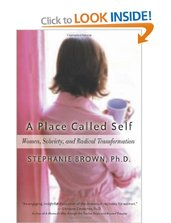 In the Resources section of the website, I have a series of my posts under the title Stephanie Brown on Recovery. These posts are based on Stephanie Brown’s wonderful 2004 book A Place Called Self: Women, Sobriety, and Radical Transformation. In her book, Stephanie talks about what happens to women in recovery, how they think, how they feel, their problems, the good things, etc. (The book is relevant to men as well!) Here is the main part of the first of my posts, entitled ‘What is Recovery’, according to Stephanie Brown (Part 1).
In the Resources section of the website, I have a series of my posts under the title Stephanie Brown on Recovery. These posts are based on Stephanie Brown’s wonderful 2004 book A Place Called Self: Women, Sobriety, and Radical Transformation. In her book, Stephanie talks about what happens to women in recovery, how they think, how they feel, their problems, the good things, etc. (The book is relevant to men as well!) Here is the main part of the first of my posts, entitled ‘What is Recovery’, according to Stephanie Brown (Part 1).
“‘Recovery has held so many surprises for me. Some good. Some bad. I didn’t know I could hurt so much. But I also didn’t know I could love so much and be so loved. I had no idea that recovery was also learning how to be in intimate relationships, learning how to have close, wonderful friends. Then there’s my marriage. My husband and I have developed a rich life together. And get this – I really like myself now. Learning about who I am and accepting me, that’s been the hardest part of recovery – and the best. I wouldn’t trade this path for anything in the world.’ Anne, Recoveree
… Stephanie Brown describes recovery as a journey, a process. It is a radical change in personal identity (or the self). See the words drugs and alcohol there. Nup! You can recover from all sorts of things, like mental mental health problems, loss of a loved one, trauma, etc.
Of course, if you take the journey to recovery, you are far less likely to have drugs and alcohol impact badly on your life. You will (re)build a meaningful and valued life, where you realise your aspirations, be treated with respect and dignity, and contribute to society. You won’t needs substances to cope with the problems of life.
Stephanie asks ‘Who is the woman in recovery?’ In the book, she talks about a woman who has been actively addicted to a substance, to a repeated compulsive behaviour, or to an individual.
‘You are a woman who has faced yourself and come to a realisation that you have lost control and cannot regain it, if indeed you ever had control. You have come to accept the fundamental, deep reality that you are powerless over your own needs and your actions to meet those needs – your active addiction.’
Stephanie’s book focuses on what happens to the woman who stops her active addiction, the woman who starts ‘a transformational process of new growth and development called recovery.’
Are you interested?”
Here are the remaining posts based on Stephanie’s book that I have written to date:
What is Recovery (Part 2)
Stephanie describes recovery as radical change in personal identity, or the self. She goes on to emphasise a number of myths about recovery.
What is Recovery (Part 3)
Stephanie emphasises that in recovery a woman transforms the way she thinks about herself, as well as the way she thinks about life itself. She points out two common myths about recovery, the first of which I’ll discuss here: ‘Recovery is moving from bad to good.’
What is Recovery (Part 4)
Stephanie talks about the second myth of recovery: dependence is bad and recovery means you are no longer dependent.
Losing a Self: Lying to Yourself
Stephanie describes how one’s self (or identity) changes in a negative manner during the process of addiction. She focuses on lying to oneself.
How Do I Cope in Early Recovery?
How do you tell your family that you need to stop drinking and that you need meetings when they don’t think anything is wrong? Or when they’re so angry they don’t want to stick around while you get well. Most of all, how do you survive each moment and each day when the pain is so great and you are so scared?’
Coping in Early Recovery: The Toddler Stage
She begins to hear a new language, the language of recovery, and, like a toddler, begins to form her new self and her new identity around the acceptance of her addiction


